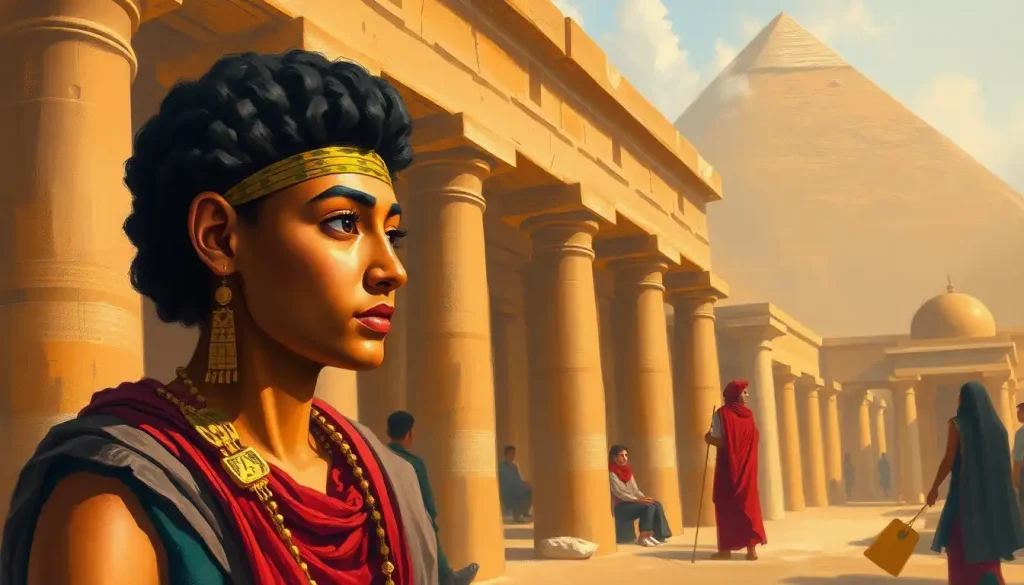Deep within Greek mythology’s richest tales lies a centuries-old case of mistaken identity that has confused scholars and storytellers alike: the persistent mixing up of the King of the Underworld with the divine keeper of fortune’s coffers. This perplexing puzzle has woven its way through the tapestry of ancient lore, leaving many to wonder: Is Hades truly the god of wealth, or is there more to this mythological mystery?
Let’s embark on a journey through the mists of time and unravel this enigma, exploring the depths of the Underworld and the heights of Olympus to separate fact from fiction. As we delve into the roles of these divine beings, we’ll discover that the truth is far more nuanced and fascinating than a simple case of mistaken identity.
Hades, with his dark reputation and subterranean domain, has long been associated with wealth in the popular imagination. Yet, this connection is not as straightforward as it might seem. To truly understand the nature of Hades and his relationship to riches, we must first explore his traditional role in Greek mythology.
Hades: Lord of the Underworld
Born to the Titans Cronus and Rhea, Hades was one of six siblings who would go on to become the major Olympian gods. After the defeat of the Titans, Hades and his brothers, Zeus and Poseidon, drew lots to divide the world among themselves. Hades drew the shortest straw, thus inheriting the realm of the dead – the Underworld.
As ruler of this shadowy domain, Hades’ primary responsibility was to oversee the souls of the deceased. He maintained order in the afterlife, ensuring that the dead remained in their designated areas and that the cosmic balance between life and death was preserved. This role earned him many epithets, including “The Unseen One” and “The Rich One” – the latter not for his material wealth, but for the abundance of souls in his kingdom.
Hades’ association with death and the afterlife gave him a fearsome reputation among the living. Mortals rarely invoked his name directly, preferring euphemisms to avoid drawing his attention. This aura of dread and mystery surrounding Hades contributed to the misconceptions about his true nature and responsibilities.
The Wealth Beneath: Hades and Subterranean Riches
While Hades was not primarily a god of wealth, his connection to the earth’s riches is not entirely unfounded. The ancient Greeks believed that precious metals and gems were formed deep within the earth, placing them squarely within Hades’ domain. This association led to one of Hades’ lesser-known epithets: “Plouton,” meaning “The Rich One.”
The etymology of “Plouton” is closely tied to the Greek word for wealth, “ploutos.” This linguistic connection likely contributed to the confusion between Hades and the actual god of wealth in Greek mythology. It’s worth noting that the Romans later adopted Hades under the name Pluto, further blurring the lines between his roles as ruler of the Underworld and a deity associated with riches.
Hades’ control over subterranean resources extended beyond precious metals. The fertility of the soil and the growth of crops were also linked to his realm, as seeds must be buried in the earth before they can sprout. This dual nature of Hades – associated with both death and the potential for new life – adds another layer of complexity to his character.
Plutus, the Greek god of wealth, is often overshadowed by the more prominent figure of Hades. Yet, it is Plutus who truly holds the divine portfolio of abundance and prosperity in Greek mythology. Understanding the distinction between these two deities is crucial for unraveling the mythological mystery at hand.
Plutus: The True Divine Treasurer
Plutus, son of Demeter and Iasion, was born in Crete and raised by the goddess of peace, Eirene. Unlike Hades, Plutus’ sole purpose was to distribute wealth among mortals. He was often depicted as a young man carrying a cornucopia, symbolizing abundance and plenty.
One of the most striking differences between Hades and Plutus lies in their personalities and how they were perceived by mortals. While Hades was feared and rarely invoked, Plutus was actively sought after and welcomed. People prayed to Plutus for good fortune and material blessings, seeing him as a benevolent force rather than a dreaded one.
Interestingly, some myths portray Plutus as blind, symbolizing the arbitrary nature of wealth distribution. This characteristic stands in stark contrast to Hades, who was known for his fairness and impartiality in judging the souls of the dead.
Cultural Interpretations and Misunderstandings
The confusion between Hades and Plutus has persisted through various cultural interpretations and adaptations of Greek mythology. The Roman adoption of Hades as Pluto, in particular, played a significant role in blending the concepts of the Underworld ruler and the god of wealth.
In Roman mythology, Pluto retained many of Hades’ characteristics but with a stronger emphasis on his connection to underground riches. This shift in focus likely contributed to the lasting misconception about Hades’ primary role.
Medieval and Renaissance interpretations further muddied the waters. As classical mythology was reinterpreted through the lens of Christian theology, Hades/Pluto often became conflated with the Christian concept of Hell and its ruler. This association added new layers of meaning and symbolism to the already complex figure of Hades.
In modern pop culture, the misunderstanding continues to propagate. Many contemporary depictions of Hades portray him as a wealthy, greedy god, often overlooking his more nuanced role as keeper of cosmic balance. While these representations can be entertaining, they often stray far from the original mythological concepts.
The True Nature of Hades’ Wealth
To truly understand Hades’ relationship with wealth, we must look beyond material riches. The wealth of Hades lies not in gold or gems, but in the souls that populate his realm. As Pluto, the god of wealth and ruler of the Underworld, Hades’ true treasure was the ever-growing population of shades under his command.
This concept of wealth extends beyond mere numbers. Hades’ role in maintaining cosmic balance was, in itself, a form of richness. By ensuring the proper functioning of the afterlife, Hades contributed to the overall health and prosperity of the mortal world above.
Philosophical interpretations of Hades’ wealth delve even deeper. Some scholars argue that Hades represents the hidden potential within the earth – not just material resources, but also wisdom and spiritual growth. In this view, the Underworld becomes a metaphor for the subconscious mind, rich with untapped possibilities.
Unraveling the Mythological Tapestry
As we near the end of our journey through this mythological labyrinth, it’s clear that the relationship between Hades and wealth is far more complex than a simple case of mistaken identity. While Hades is not the god of wealth in the traditional sense, his connection to subterranean riches and his role as keeper of souls give him a unique place in the pantheon of Greek deities.
Understanding the nuanced relationship between Hades and wealth allows us to appreciate the depth and complexity of Greek mythology. It reminds us that these ancient stories are not mere entertainment, but rich tapestries of symbolism and meaning that continue to resonate with us today.
The confusion between Hades and Plutus serves as a valuable lesson in the importance of accurate mythological knowledge. As we explore these ancient tales, we must be careful not to oversimplify or misinterpret the roles of various deities. Each god and goddess played a specific part in the cosmic order, and understanding these roles can provide valuable insights into the beliefs and values of ancient cultures.
Moreover, this mythological mystery highlights the fascinating ways in which cultural interpretations can shape our understanding of ancient stories. From the Roman adaptation of Pluto to modern pop culture representations, each retelling adds new layers to the original myths, creating a rich tapestry of meaning that spans centuries.
As we conclude our exploration of Hades and his relationship to wealth, it’s worth considering how this knowledge might enrich our understanding of other mythological figures. For instance, how might our perception of the Greek goddess of wealth, Plutus, change in light of this clarification? Or how does this compare to the concepts of wealth and the underworld in other cultures, such as the wealth of ancient Egypt?
These questions remind us that mythology is not a static field of study, but a living, breathing entity that continues to evolve and inspire. By delving deep into these ancient stories, we not only uncover historical truths but also gain valuable insights into the human condition and our enduring fascination with wealth, power, and the mysteries of life and death.
So the next time you encounter a tale of Hades and his riches, remember that the true wealth of the Underworld lies not in gold or gems, but in the profound mysteries of existence itself. And perhaps, like the ancient Greeks, we too can find value in both the visible treasures of the earth and the hidden riches of the soul.
References:
1. Burkert, W. (1985). Greek Religion. Harvard University Press.
2. Hard, R. (2004). The Routledge Handbook of Greek Mythology. Routledge.
3. Graves, R. (1955). The Greek Myths. Penguin Books.
4. Kerenyi, K. (1951). The Gods of the Greeks. Thames & Hudson.
5. Morford, M. P. O., & Lenardon, R. J. (2003). Classical Mythology. Oxford University Press.
6. Parker, R. (2011). On Greek Religion. Cornell University Press.
7. Rose, H. J. (1928). A Handbook of Greek Mythology. Methuen & Co.
8. Smith, W. (1870). Dictionary of Greek and Roman Biography and Mythology. Little, Brown and Company.
9. Vernant, J. P. (1983). Myth and Thought among the Greeks. Zone Books.
10. West, M. L. (2007). Indo-European Poetry and Myth. Oxford University Press.












Would you like to add any comments? (optional)